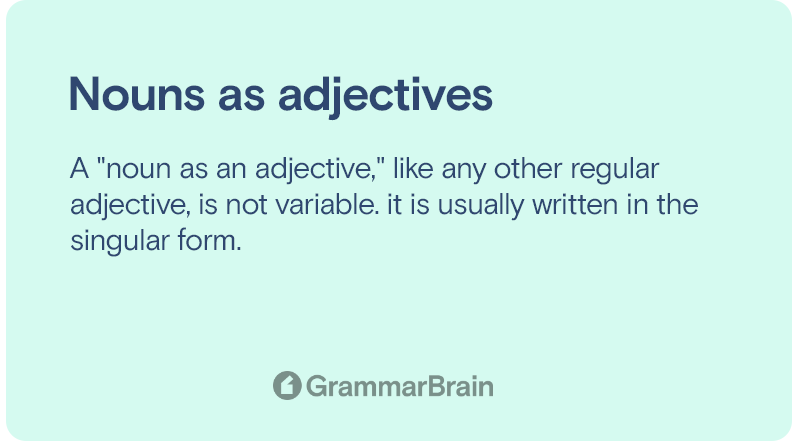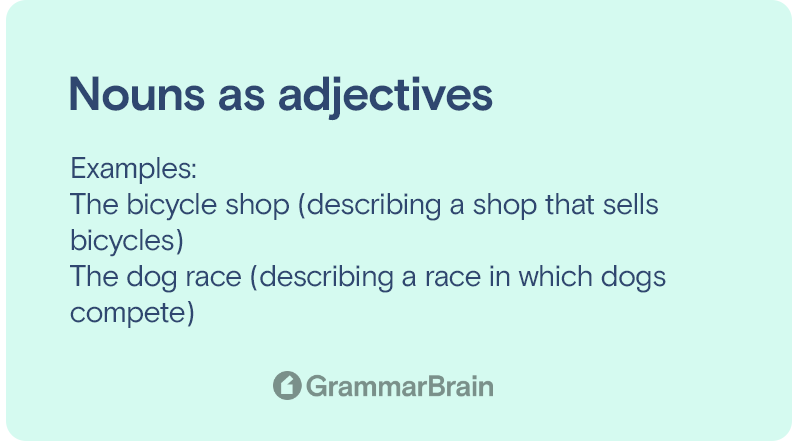What is an adjective as a noun? An adjective, in English, is a word that describes a noun. A noun is the name of an object, person, animal, or thing. In English, an adjective is a word used to give a quality to a noun.
Nonetheless, sometimes, a noun is used to describe another noun. In such cases, the noun used for description becomes an adjective. Let’s jump in and learn more about how these word forms function in the English language.

What are “nouns as adjectives?”
Nouns and adjectives are parts of speech in the English language. While studying different parts of speech in English, students learn about nouns, adjectives, adverbs, verbs, and other relevant parts of speech used in writing and speaking in English.
A “noun as an adjective,” like any other regular adjective, is not variable. it is usually written in the singular form.

Note how the words are used below:
- The bicycle shop (describing a shop that sells bicycles)
- The dog race (describing a race in which dogs compete)
Once the explanations of the two most common parts of speech, nouns, and adjectives, are made, it is not difficult to understand how they are used interchangeably.
In several sentences in English, a noun’s function turns into that of an adjective. The same is true for an adjective – it can turn into a noun.
An example in English education that is often seen:
- The English woman spoke clearly.
Here, “English” is an adjective used to describe the nationality of a “woman,” a noun.
- The English have been in the shipbuilding industry for centuries.
Here, “English” stands for the name of a population of people from England and is a noun.
In terms of language, it is crucial to know how the system of using nouns as adjectives and adjectives as nouns works.
How does it work?
The examples mentioned in the previous section make it easy to see how adjectives can be used as nouns and the other way around.
Nonetheless, if English education is imparted appropriately, it is crucial to grasp some nuances of how this works. Nouns born of adjectives occur with the definite article “the” placed before the noun.
Consequently, words like “rich,” “poor,” “employed,” etc., are adjectives when seen alone but nouns when used with “the.”
Note the examples below:
- The poor are not helped by the rich.
- The employed are facing a lot of challenges in the workplace.
- The rich are getting wealthier by the day.
- The deaf are in separate areas of the hospital.
English can be confusing if the use of words is not studied in the correct context. This is why it is important to know how adjectives exist as nouns and the other way around.
Sometimes, in English, certain adjectives exist in phrases (adjective phrases):
- In short, don’t make a big deal out of it.
- He has lost his belongings in the long and short of the situation.
- At best, she can have the goods delivered to you by this evening.
- Bob stood by John through thick and thin.
As part and parcel of English education, these phrases are essential when a message is to be conveyed. This is why the way adjectives are used as nouns is vital to grasp.
Grammar rules
In the education of the English language, some rules apply when adjectives are used as nouns.
These are largely unspoken but are necessary to know:
- Adjectives may act as nouns.
- Adjectives are objects, subjects, or complements in any phrase or sentence.
- In whichever way adjectives act as nouns in the English language, the definite article “the” precedes the adjective to turn the adjective into a noun.
Sentence Examples
Here are some common examples in which adjectival words function as nouns, both in terms of subject nouns and object nouns:
- The King is a fan of the intelligent.
- The elderly are among the most cared for in the population.
- Susan had a knack for catching the rich and famous.
- The young are often influenced by social media.
- The meek are those who refuse to speak.
FAQs
Can an adjective perform the function of a noun?
This is possible, and an adjective can be used, in some instances, as a noun.
Can adjectives represent noun subjects or objects in a phrase?
In English education, adjectives may represent both objects and subjects in a phrase or a sentence.
More resources:
- Adjectives used as nouns (englishgrammar.org)
- Adjectives that Look Like Nouns: Explanations and Examples | Merriam-Webster
- Nouns as Adjectives | When Nouns Act Like Adjectives – ESL Grammar
- Nouns as adjectives: my one simple tip to avoid mistakes (ieltsetc.com)
Inside this article
Fact checked:
Content is rigorously reviewed by a team of qualified and experienced fact checkers. Fact checkers review articles for factual accuracy, relevance, and timeliness. Learn more.
Core lessons
Glossary
- Abstract Noun
- Accusative Case
- Anecdote
- Antonym
- Active Sentence
- Adverb
- Adjective
- Allegory
- Alliteration
- Adjective Clause
- Adjective Phrase
- Ampersand
- Anastrophe
- Adverbial Clause
- Appositive Phrase
- Clause
- Compound Adjective
- Complex Sentence
- Compound Words
- Compound Predicate
- Common Noun
- Comparative Adjective
- Comparative and Superlative
- Compound Noun
- Compound Subject
- Compound Sentence
- Copular Verb
- Collective Noun
- Colloquialism
- Conciseness
- Consonance
- Conditional
- Concrete Noun
- Conjunction
- Conjugation
- Conditional Sentence
- Comma Splice
- Correlative Conjunction
- Coordinating Conjunction
- Coordinate Adjective
- Cumulative Adjective
- Dative Case
- Determiner
- Declarative Sentence
- Declarative Statement
- Direct Object Pronoun
- Direct Object
- Diction
- Diphthong
- Dangling Modifier
- Demonstrative Pronoun
- Demonstrative Adjective
- Direct Characterization
- Definite Article
- Doublespeak
- False Dilemma Fallacy
- Future Perfect Progressive
- Future Simple
- Future Perfect Continuous
- Future Perfect
- First Conditional
- Irregular Adjective
- Irregular Verb
- Imperative Sentence
- Indefinite Article
- Intransitive Verb
- Introductory Phrase
- Indefinite Pronoun
- Indirect Characterization
- Interrogative Sentence
- Intensive Pronoun
- Inanimate Object
- Indefinite Tense
- Infinitive Phrase
- Interjection
- Intensifier
- Infinitive
- Indicative Mood
- Participle
- Parallelism
- Prepositional Phrase
- Past Simple Tense
- Past Continuous Tense
- Past Perfect Tense
- Past Progressive Tense
- Present Simple Tense
- Present Perfect Tense
- Personal Pronoun
- Personification
- Persuasive Writing
- Parallel Structure
- Phrasal Verb
- Predicate Adjective
- Predicate Nominative
- Phonetic Language
- Plural Noun
- Punctuation
- Punctuation Marks
- Preposition
- Preposition of Place
- Parts of Speech
- Possessive Adjective
- Possessive Determiner
- Possessive Case
- Possessive Noun
- Proper Adjective
- Proper Noun
- Present Participle
- Prefix
- Predicate



